Not Your Average Family
Try as they might, the BBC can't hide the fact that the subjects of their new documentary are deeply disturbed
The BBC has broadcast a three-part series on the lives of a couple in a relationship, and while from the outset it is overt transgender activism propaganda, what’s particularly shocking about it is the lack of questions asked by the BBC about the couple, despite clues to troubling behaviour being littered throughout the series.
Not Your Average Family is a docuseries featuring three half-hour episodes exploring two people described as “social media influencers”, Charlie Allan (a ‘trans man’) and Lauren Faulkner (a woman). Straight away this is misleading as Lauren’s fame actually came from posting sexually explicit solo and lesbian videos on OnlyFans. Furthermore, from Charlie’s crowdfunding for transgender surgery to Lauren’s notoriety she gained by using a racial slur, both have received negative publicity in the past, but none of this is even referenced in the series. It’s also not mentioned that this is the second BBC documentary about them, as a one-off episode was broadcast in 2020.
They’re introduced as ‘Charlie is transgender and Lauren has OCD’. But this is also misleading. Lauren’s OCD is only briefly mentioned while the three episodes are almost entirely about the fact that Charlie is a woman who says she identifies as a man.
Both Charlie and Lauren are publicity-hungry, although no attempts are made to find out why. The series starts with a look at Charlie’s success on social media, in which she has more than half a million followers on TikTok, where she principally talks about what it’s like for a girl to take testosterone. This has provided her with a large amount of money, which she has used to buy a house and invest in the creation of an “inclusive salon to help trans people”. No questions are asked about the morality of a young woman being paid large sums to promote powerful drugs to children, instead, Charlie is simply portrayed as someone who posts fun and educational videos.
Lauren is described as having mental health problems and she reveals that she doesn’t want to be on OnlyFans (still referred to as “social media”) anymore. However, few details are given, and no questions about the potential link between her mental health and porn work are asked. Footage of her performing softcore mostly solo porn is shown, but she then adds “Any time we [Charlie and her] would have sex I thought ‘we should film this’, and it took away our passion and intimacy because it was for thousands of people.” This is the only time in the three episodes that it’s even mentioned that they sold videos of themselves having sex on the internet to strangers.
We then discover what the series was probably meant to be about (when it was announced in 2022, the BBC said it would be four episodes but only three were broadcast): Charlie wants to be what she describes as a “dad”. But because she’s on testosterone, she no longer has periods, so she has decided to stop taking it in order to donate an egg to Lauren. No questions are asked about whether this would be healthy for the baby, particularly as Lauren has eggs of her own, which haven’t been damaged by powerful drugs. Instead, we’re just meant to accept that Charlie’s narcissism is more important than the baby’s health, as she says: “I really would struggle with watching Lauren getting to be the full creation of the baby”. Interestingly, Charlie has bought boy’s baby clothes, which are hung up around the house, and Lauren states that Charlie wants a boy. Again, no questions are asked as to why she wants a boy, what she thinks a boy is or if this is appropriate behaviour.
We see other aspects of Charlie’s life, with suggestions that she grooms other girls into transitioning. (Also notice the background drawings of penises and breasts the BBC has used in this screenshot, in which Charlie is talking about her friend Zak, shown pre transition).
We discover that Zak is having largely unspecified issues with testosterone. Charlie tells her she “will get there and after that all you’d really have left is ‘bottom surgery’”. However, Zak says she wants to date and even adds “I’m not interested in it [bottom surgery]”. We don’t know how Charlie reacts to this as the conversation is clearly edited, and it ends nonsensically just a few seconds later with Zak saying she will stay single until she has bottom surgery, the opposite of what she’d just said, which clearly pleases a smiling Charlie.
Charlie and Zak then visit Cosmedicare, a transgender clinic at St Ellen’s Private Hospital, where they make social media videos for Gill Baird, who works there, to help with her marketing. Charlie reveals Gill is her “trans mum”, and it was at Cosmedicare that she had her double mastectomy. Gill says she has a son who identifies as a girl called Chloe. Despite having no medical qualifications, Gill is presented as an authority on medical issues.
Charlie tells her she’s just come off testosterone and is finding life impossible. She implies she’s been abusive to Lauren. “I don’t recognise myself. I’m horrible at Lauren. I’m absolutely horrible at the person I love. I can’t even go home.” No details are given as to what has happened in their relationship and Gill tells her not to worry about whatever she’s done to Lauren, and not to blame herself but instead, it’s the system’s fault for not giving her a counsellor.
“I feel horrendous,” says a weeping Charlie, suggesting she can’t cope with staying off testosterone. Even though this revelation is essential to the entire series, as it will later lead to Charlie going back on the hormone, and therefore ending her hopes of donating an egg, it’s glossed over in a few seconds. No attempts are made to explain what testosterone can do to a girl’s body, what the long-term effects of it are or why coming off it is so difficult.
We see Lauren and her mother having lunch, which is presented as an introduction to Lauren’s OCD, in which she states she’s “been in and out of psychological therapy since I was nine”, and that she refuses to touch anything with her bare hands. She also ruined her teeth by obsessively eating mints and has emetophobia. Is her fear of touching and being touched related to a traumatic incident in her childhood, and is that related to why she has a male-presenting partner who doesn’t have a penis? We don’t find out because none of the causes of her issues are explored and, instead, more time is simply given to the mother talking about how it didn’t bother her that her daughter has a transgender partner.
Episode two begins with Charlie revealing that she’s had three periods and therefore can be screened to see if she’s eligible to donate her eggs to Lauren. They’ve said they’re desperate to become parents but they also reveal they didn’t even bother to fill out the necessary form. Lauren suggests that they just lie and state that they have filled it out, but Charlie thinks they can email the form now and they don’t need to lie. This default-to-dishonesty could be an insight into how they operate but no questions are asked about it. Lauren reveals she has ADHD as well as OCD, which had not been mentioned before. It’s not explained how this affects her.
We then see their attempts to buy a salon business have had a knockback: The building they made an application to buy is a storage facility and not a retail one, so the council has told them they have to pay £1,800 to change the shop’s legal use. This is presented as a major setback. Charlie asks: “Is it because I’m trans?”
The victimhood narrative is then ramped up. Charlie reveals that they “got hate-crimed outside our house.” Lauren explains that someone recognised them from social media and called Charlie a “he-she” and used “the T slur”, and then chased Charlie into her house. Lauren says the attacker told her she should never have children. No description is given of this abuser other than it was a man, there’s no suggestion that the police were called or that there were any witnesses and, even though the duo live their lives on camera and are being followed around by a BBC television crew, none of the attack was captured. It’s also worth noting that they’ve just moved into a new neighbourhood, in which the location has not been publicly disclosed, so the attacker must have been in their street when he recognised them. No mention of what happened to the attacker is made again.
We then meet Charlie’s “dad”, who’s been supportive of Charlie’s transition. Except he’s not his father, he was in a relationship years ago with Charlie’s mum and stayed in Charlie’s life. We discover that Charlie was an unhappy teenager with a different surname, and liked playing football. “The biological father isn’t my dad,” she adds. No attempts are made to ask what happened with her father or why she changed her surname. No questions are asked about why Charlie views this man she’s not biologically related to as her father but can’t bear the thought of having a child that she’s not biologically linked to. Charlie reveals she was £19,000 in debt when she was 19. We don’t find out why.
She then reveals she wants to have what she calls a penis surgically installed on her body. Few details are given as to what this actually entails or why she wants it bar her saying “I want to pee on you” to Lauren.
Charlie then discovers that she needs medication to improve the quality of her eggs. She says she’s not prepared to do this. Lauren says Charlie is “really upset and dysphoric” and Charlie reveals she’s had a “meltdown”. No details are given as to what any of this means or entailed bar Charlie deleting some old Instagram pictures, but Charlie says she needs to take testosterone again, and we see her injecting herself. Despite the now various clues that Charlie abuses and controls vulnerable young women, her behaviour is not challenged and the episode ends with Lauren making this revealing statement to Charlie.
Lauren still wants to be a mother, so the plan now is to use her eggs. But, presumably, because this docuseries was meant to be about a ‘transgender birth’, episode three barely touches on the baby issue and instead, we mostly watch them open their salon.
Charlie reveals that she’s planning to get a gender recognition certificate so she can be recorded as the father on the birth certificate. No explanation is given as to why she could be recorded as the father despite being a woman who’s not biologically related to the baby.
Charlie is then filmed attending protests for self-ID in Scotland. We’re subjected to a few minutes of incoherent arguments for self-ID. No case against it, or explanation why some people might be opposed to it, is presented.
We meet transgender staff at the salon, who are presented as victims. In footage of the opening party, we see one of them groping Lauren’s mother. The series ends.
The BBC says it aims to follow the Reithian directive to “inform, educate and entertain”. However, this series meets none of that criteria. This could have been an informative and educational series about what led a girl to take testosterone, the causes of OCD, how a lesbian couple get pregnant and so on, but none of this is explored. At no point are the couple entertaining. As the series draws on, we find clues that one of them might be abusive, but either no questions are asked about her behaviour or, if they are asked, answers are not provided or are cut out. We’re just left with an hour and a half of an anodyne and disjointed advert for a salon and a transgender clinic. If you contrast the series with A Change Of Sex, which tried to present a full picture of the life of a man who identified as a woman, broadcast in 1979, 1980 and 1999, you can see just how much the BBC has fallen this century.




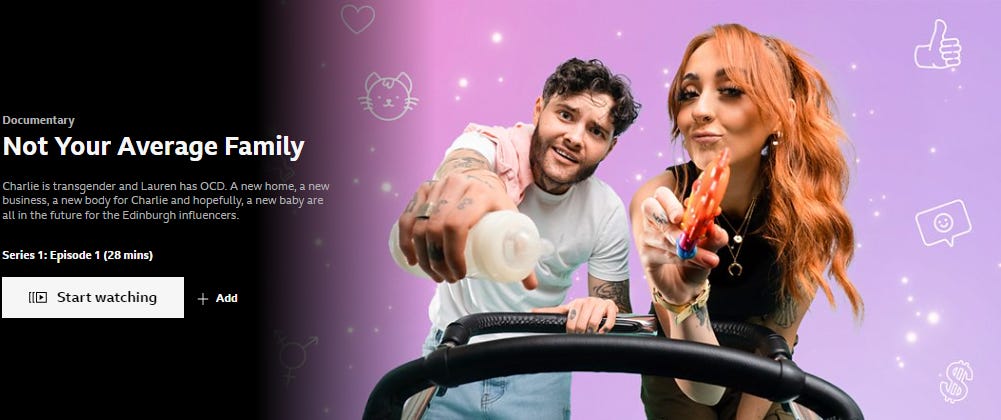
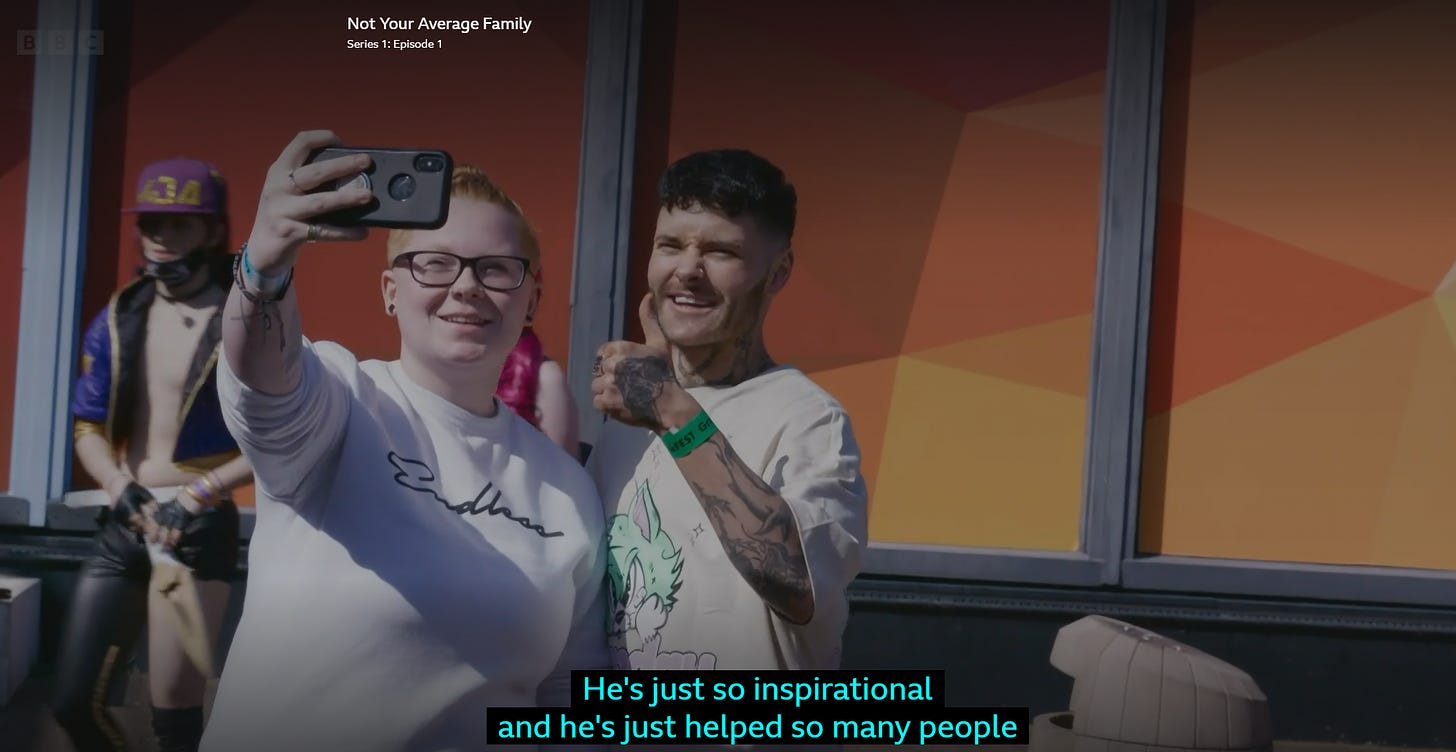
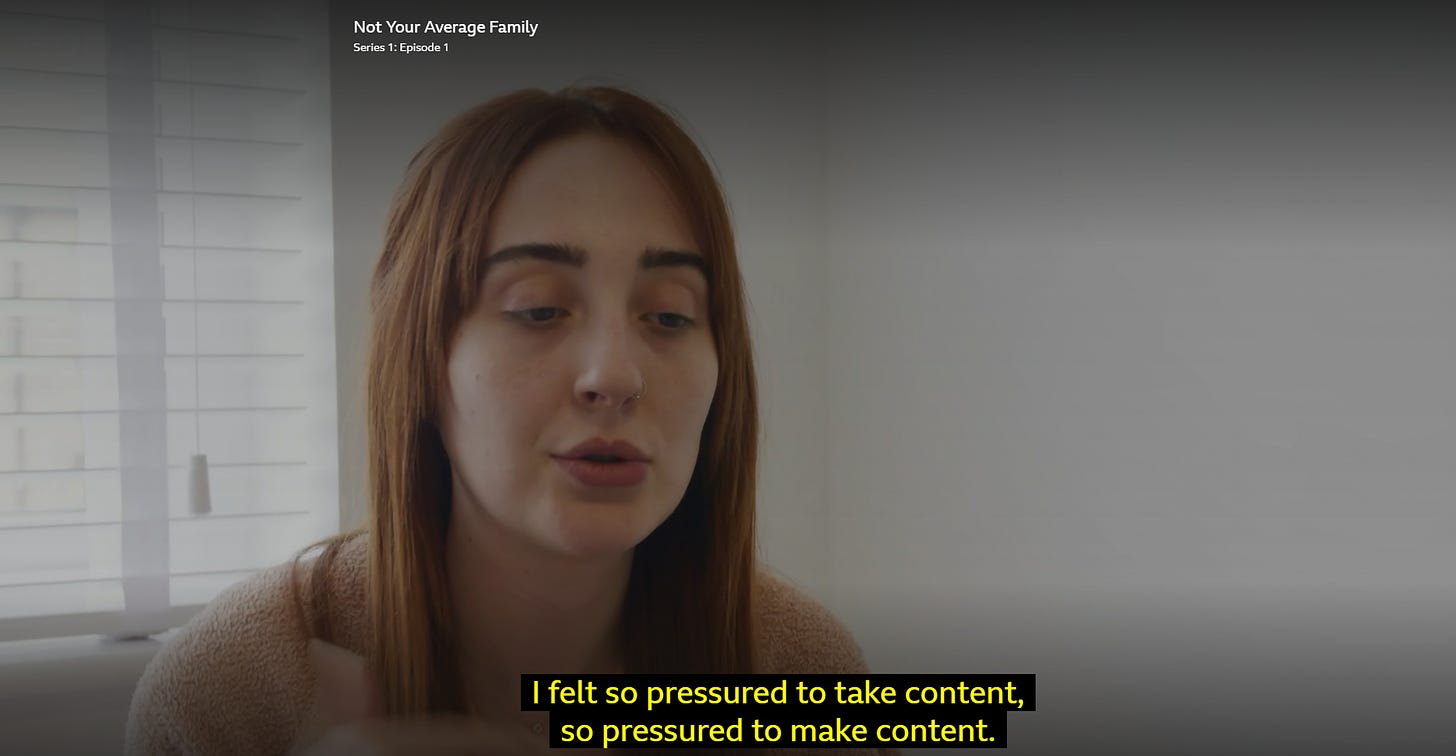
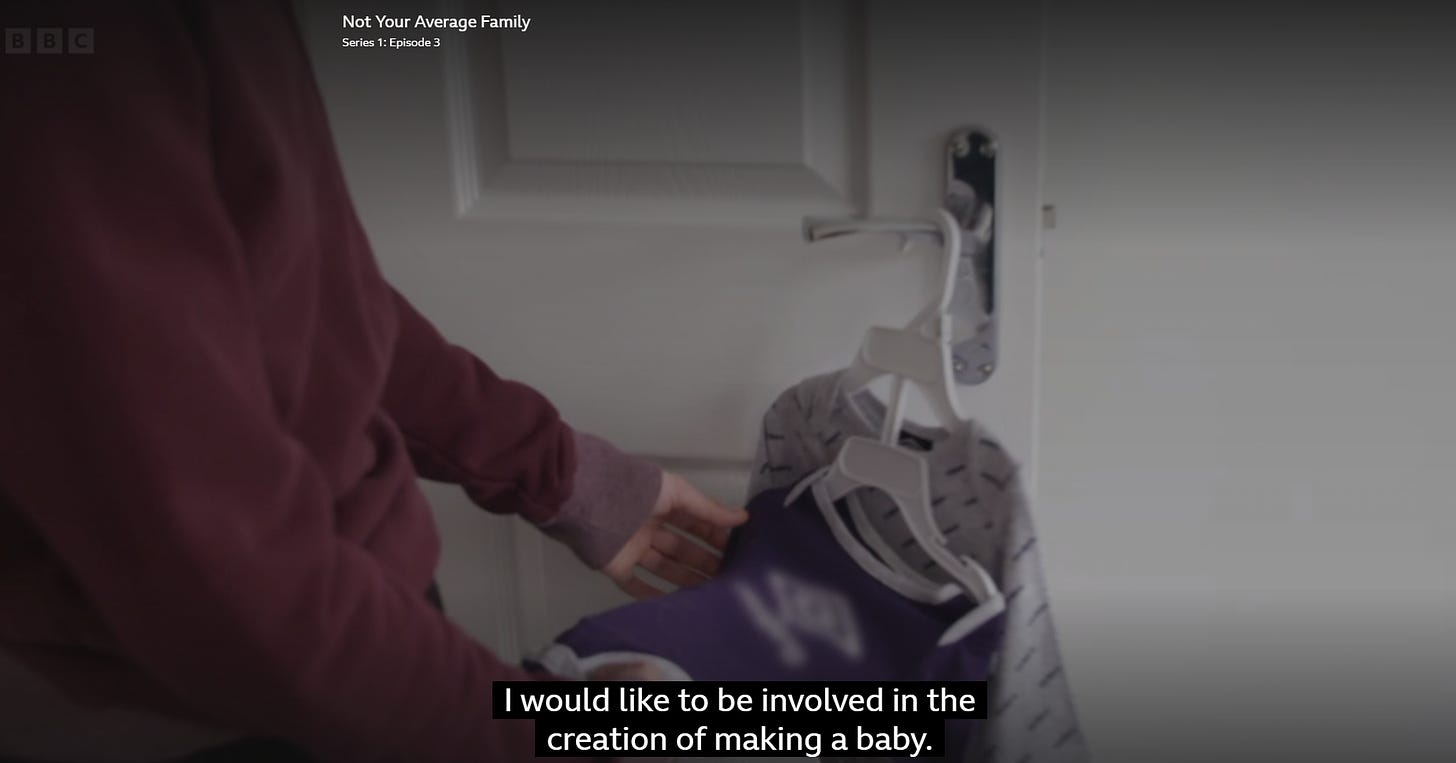
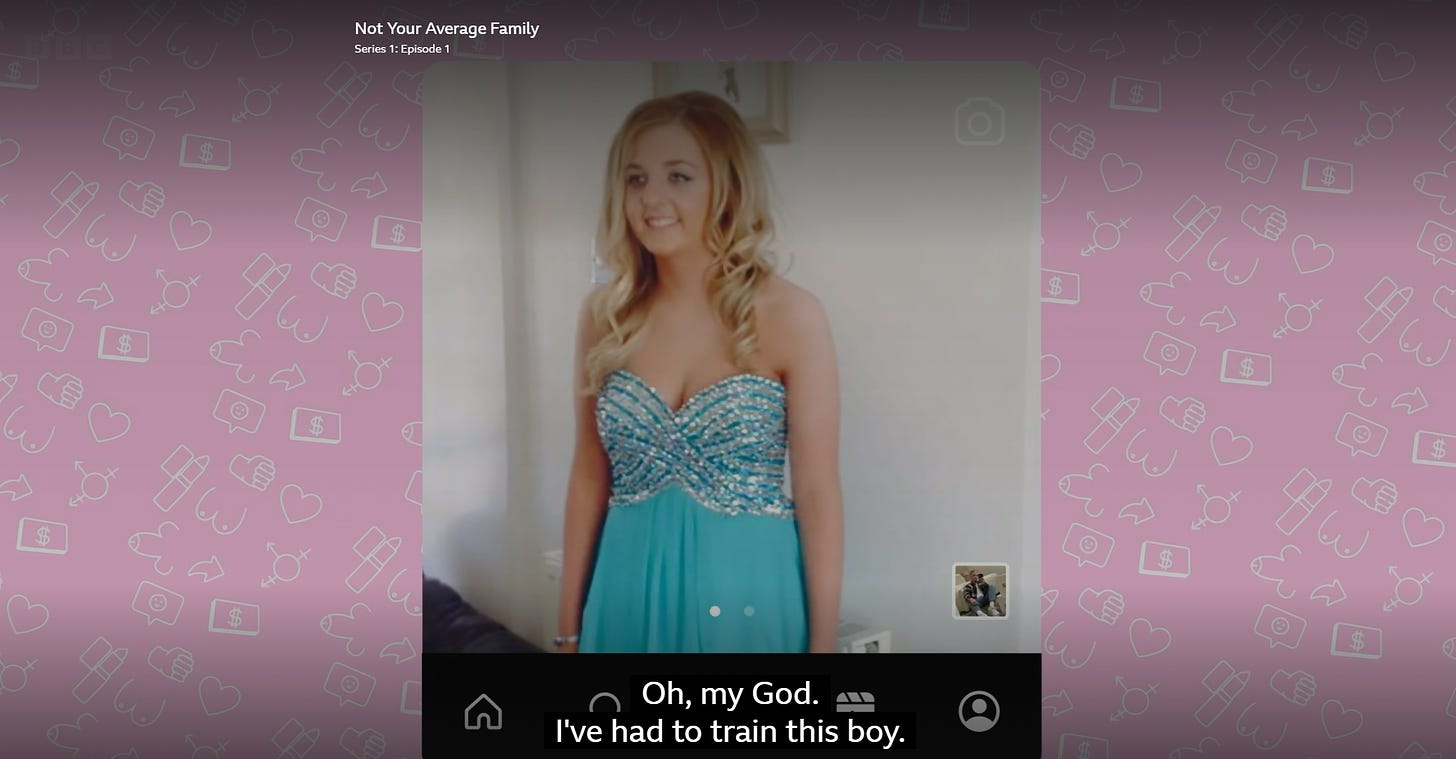
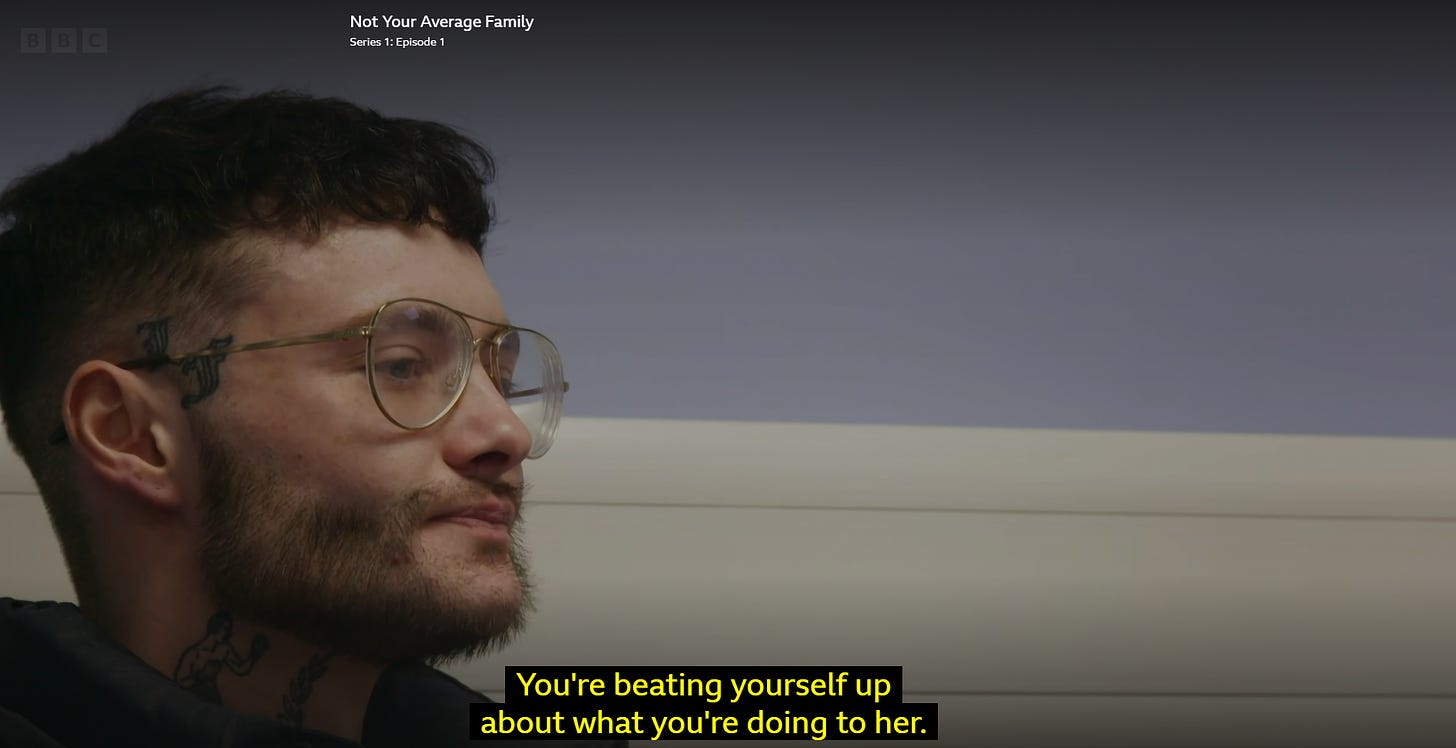
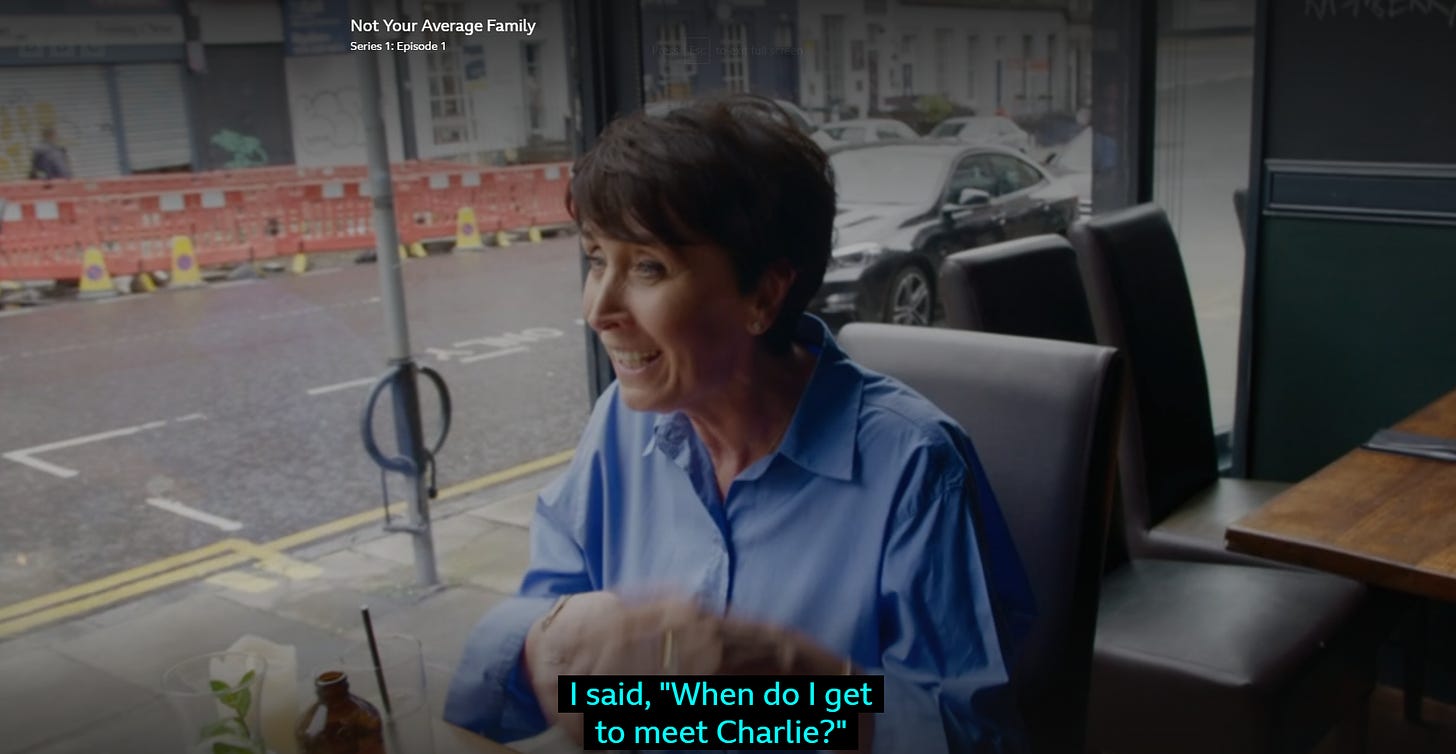
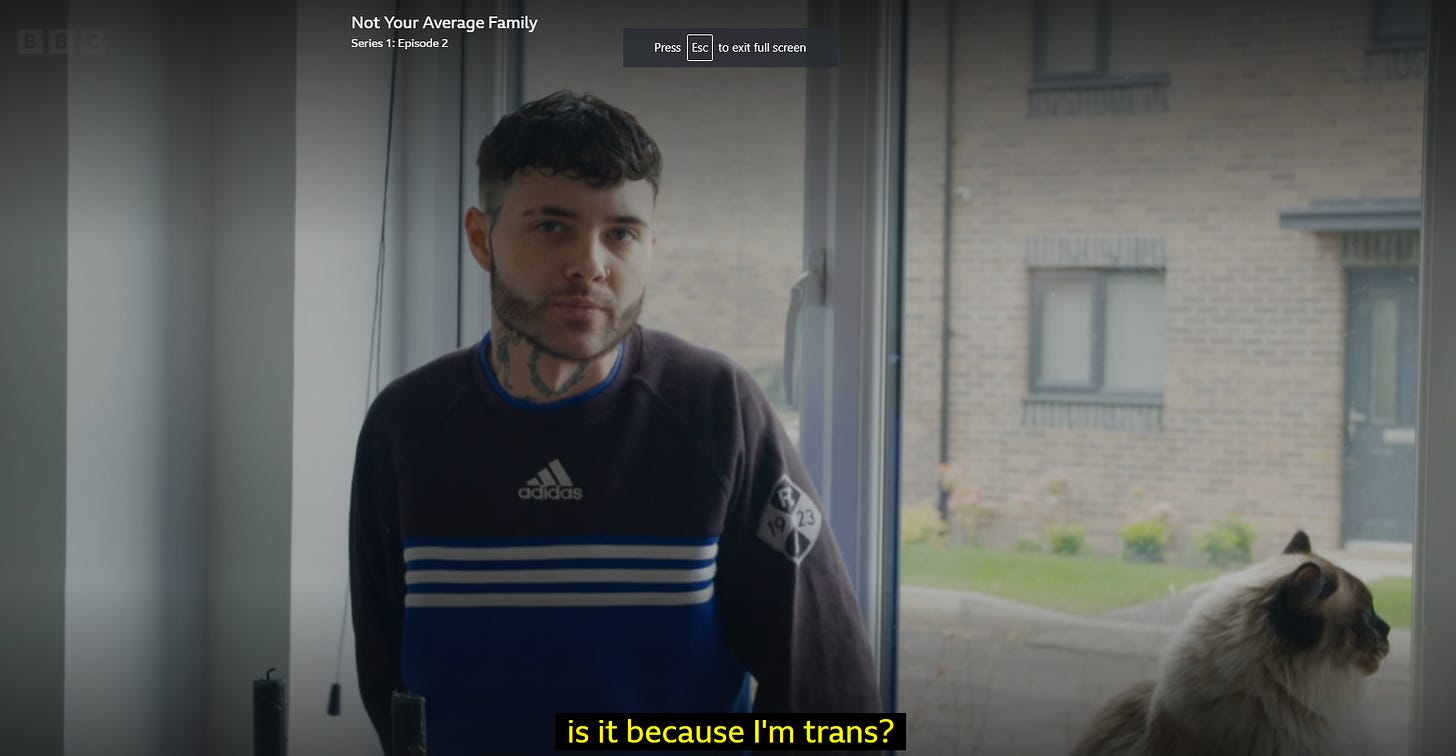
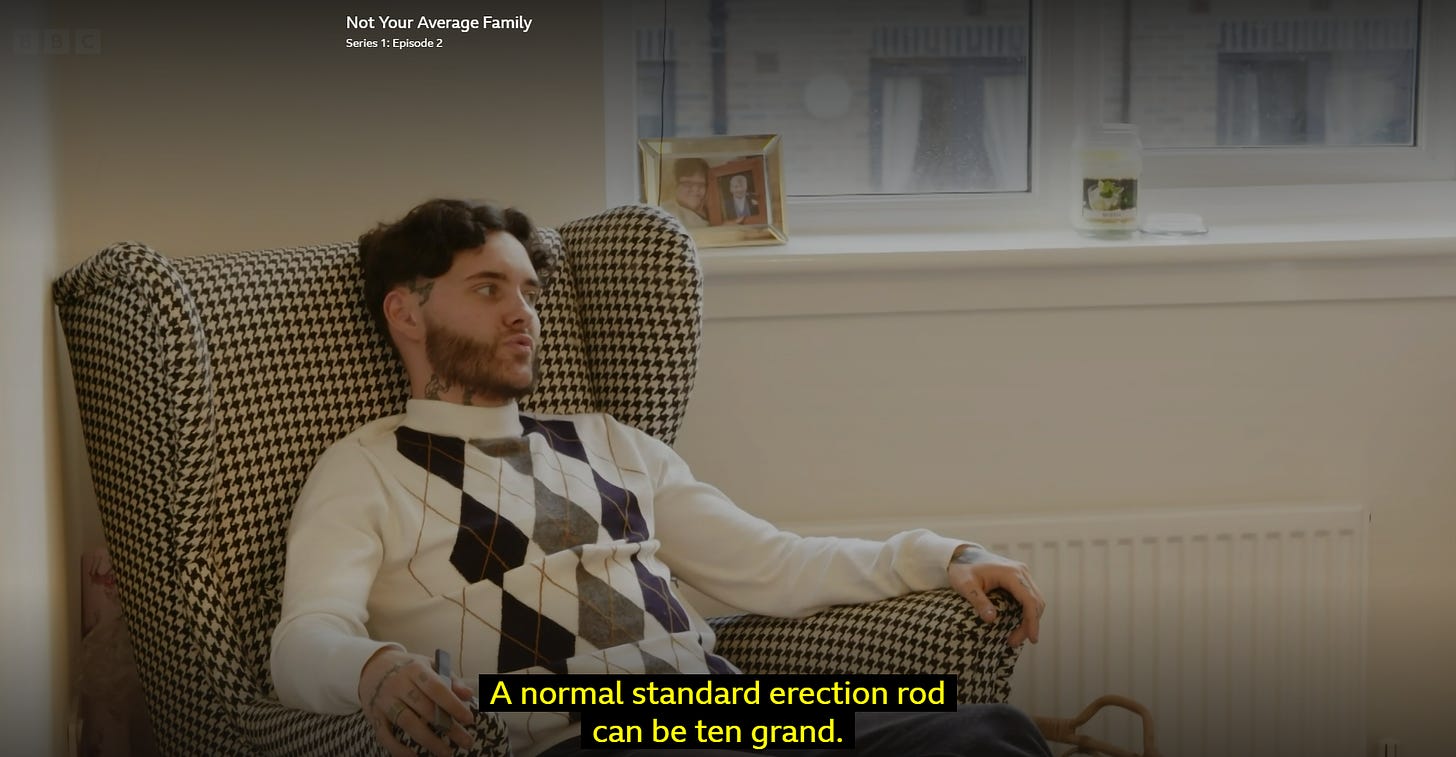
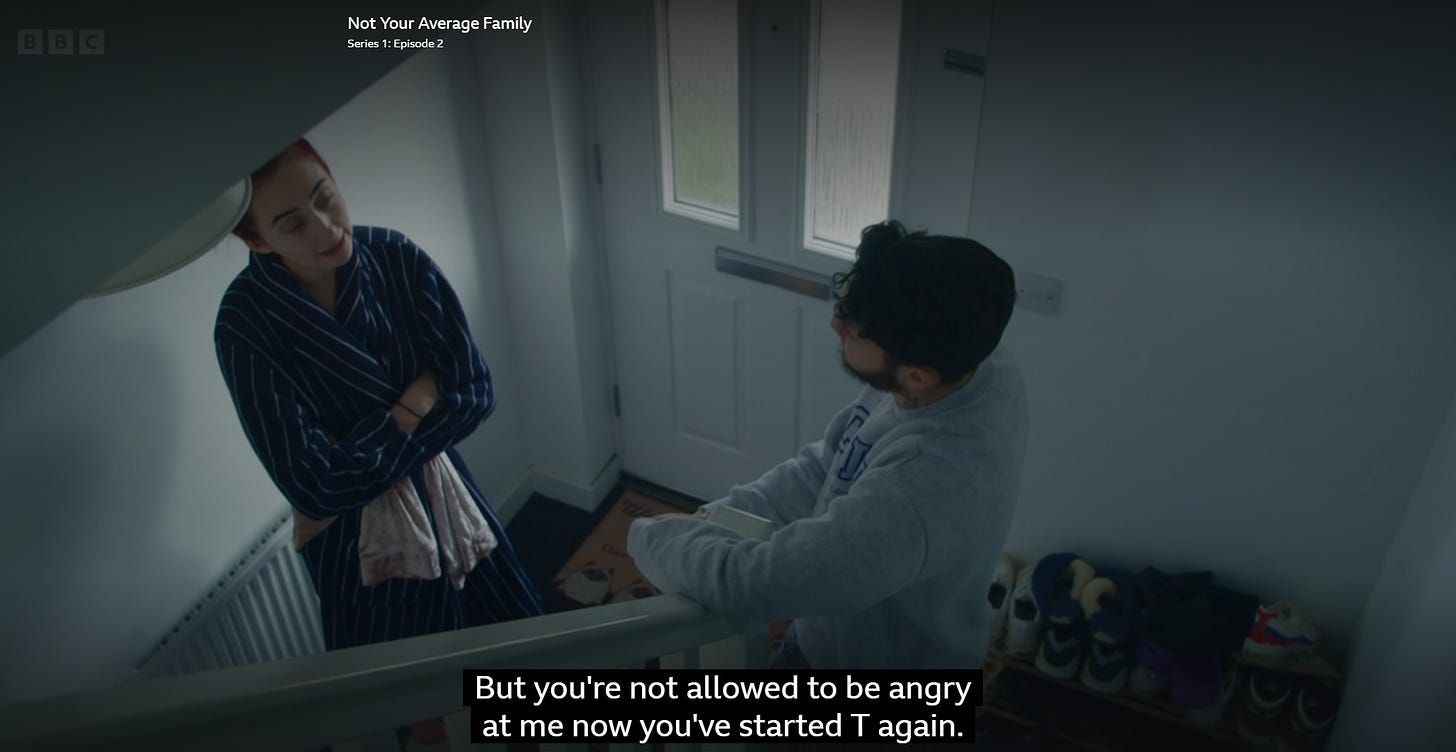
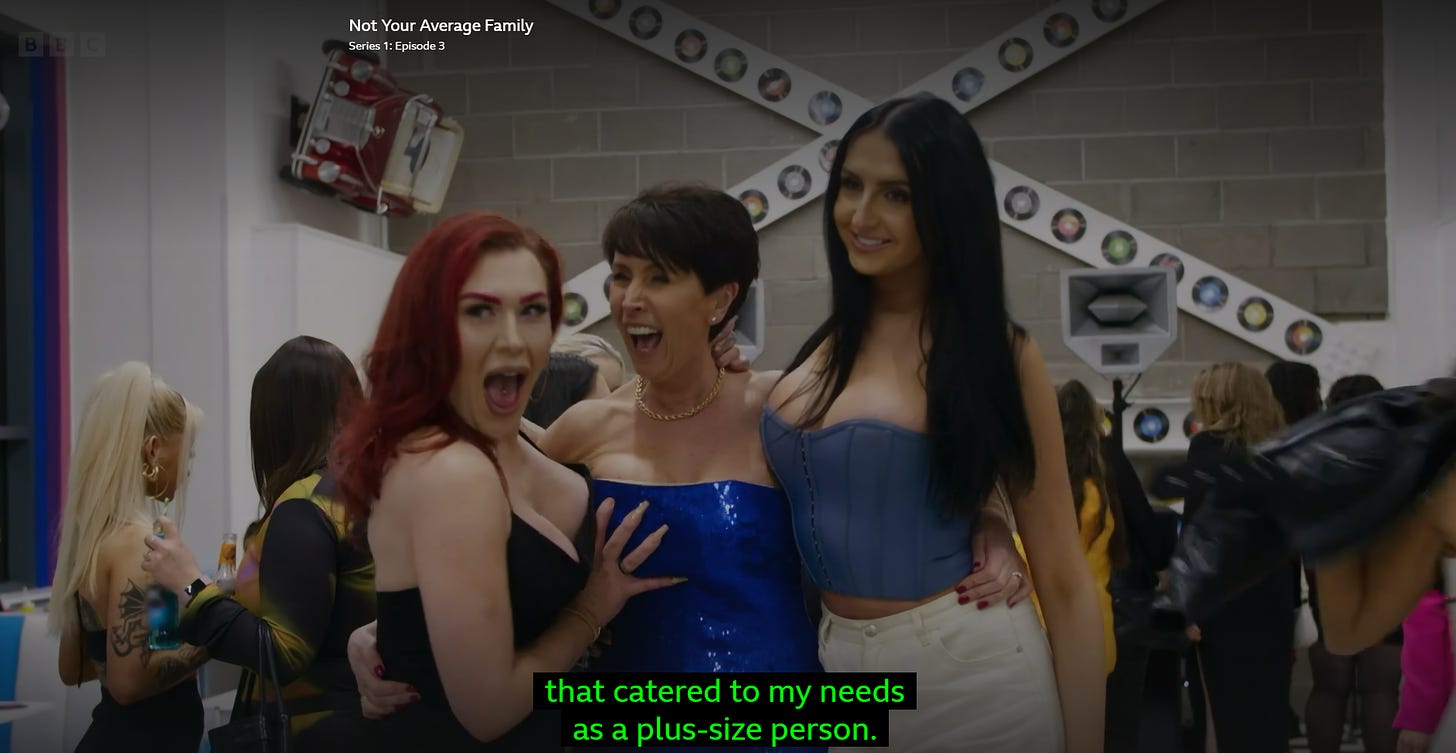
My God, what a satisfactory sentence: "Try as they might, the BBC can't hide the fact that the subjects of their new documentary are deeply disturbed ... "
Let them continue to tell the Story of this deeply dangerous ideology -- you know that ideology -- the one that magnetizes disturbed personalities. People have to know it's not all about 'love', 'authenticity', 'kindness', 'social justice', 'stunning' and 'brave' 'explorers' of the new 'gender' horizon, etc. etc. In fact, it's the complete opposite of everything that is Good. It's all about hatred, phoniness, cruelty, anti-social injustice, cowardly re-inforcers of gender stereotype, etc. etc. We are in an existential crisis of mass delusion, mass capitulation, and mass ignorance. These true crime stories may serve to wake up the public.
Many thanks ripx4nutmeg. An exceptionally clear unpacking of this tv series.